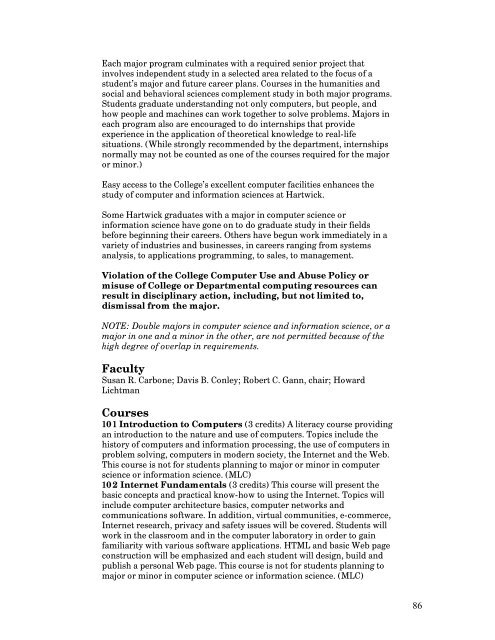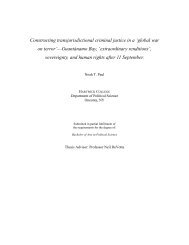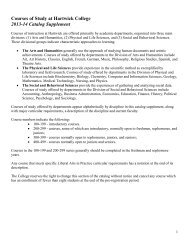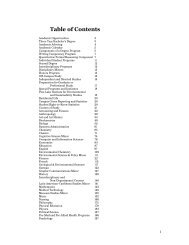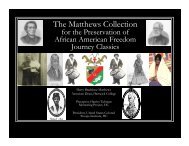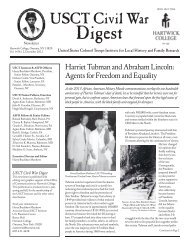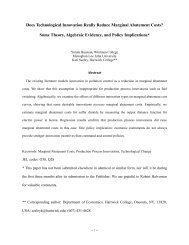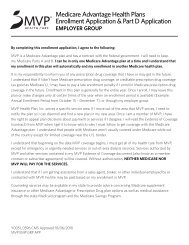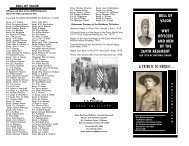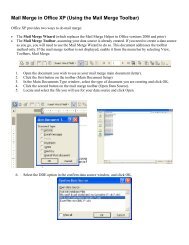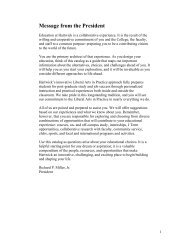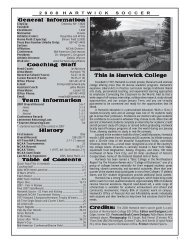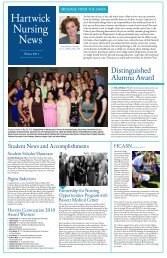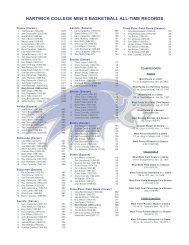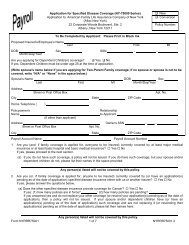Table of Contents - Hartwick College
Table of Contents - Hartwick College
Table of Contents - Hartwick College
You also want an ePaper? Increase the reach of your titles
YUMPU automatically turns print PDFs into web optimized ePapers that Google loves.
Each major program culminates with a required senior project that<br />
involves independent study in a selected area related to the focus <strong>of</strong> a<br />
student’s major and future career plans. Courses in the humanities and<br />
social and behavioral sciences complement study in both major programs.<br />
Students graduate understanding not only computers, but people, and<br />
how people and machines can work together to solve problems. Majors in<br />
each program also are encouraged to do internships that provide<br />
experience in the application <strong>of</strong> theoretical knowledge to real-life<br />
situations. (While strongly recommended by the department, internships<br />
normally may not be counted as one <strong>of</strong> the courses required for the major<br />
or minor.)<br />
Easy access to the <strong>College</strong>’s excellent computer facilities enhances the<br />
study <strong>of</strong> computer and information sciences at <strong>Hartwick</strong>.<br />
Some <strong>Hartwick</strong> graduates with a major in computer science or<br />
information science have gone on to do graduate study in their fields<br />
before beginning their careers. Others have begun work immediately in a<br />
variety <strong>of</strong> industries and businesses, in careers ranging from systems<br />
analysis, to applications programming, to sales, to management.<br />
Violation <strong>of</strong> the <strong>College</strong> Computer Use and Abuse Policy or<br />
misuse <strong>of</strong> <strong>College</strong> or Departmental computing resources can<br />
result in disciplinary action, including, but not limited to,<br />
dismissal from the major.<br />
NOTE: Double majors in computer science and information science, or a<br />
major in one and a minor in the other, are not permitted because <strong>of</strong> the<br />
high degree <strong>of</strong> overlap in requirements.<br />
Faculty<br />
Susan R. Carbone; Davis B. Conley; Robert C. Gann, chair; Howard<br />
Lichtman<br />
Courses<br />
101 Introduction to Computers (3 credits) A literacy course providing<br />
an introduction to the nature and use <strong>of</strong> computers. Topics include the<br />
history <strong>of</strong> computers and information processing, the use <strong>of</strong> computers in<br />
problem solving, computers in modern society, the Internet and the Web.<br />
This course is not for students planning to major or minor in computer<br />
science or information science. (MLC)<br />
102 Internet Fundamentals (3 credits) This course will present the<br />
basic concepts and practical know-how to using the Internet. Topics will<br />
include computer architecture basics, computer networks and<br />
communications s<strong>of</strong>tware. In addition, virtual communities, e-commerce,<br />
Internet research, privacy and safety issues will be covered. Students will<br />
work in the classroom and in the computer laboratory in order to gain<br />
familiarity with various s<strong>of</strong>tware applications. HTML and basic Web page<br />
construction will be emphasized and each student will design, build and<br />
publish a personal Web page. This course is not for students planning to<br />
major or minor in computer science or information science. (MLC)<br />
86


